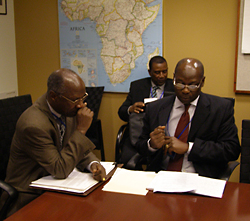World Bank: Sierra Leone emergency power meeting

In a promising move beyond the status quo, government officials in Sierra Leone collaborated and worked around the clock this month to approve an energy sector strategy that will bring a stable power supply back to the post-conflict nation for an interim period until permanent measures can be put in place.
With only two percent of households able to access electricity, the West African country of six million people but only 40,000 electricity customers, has one of the lowest connectivity rates in the world. With a dilapidated power distribution network and a financially struggling, power utility, even those with electricity access suffer unreliable service and are forced to generate their own power using polluting, expensive and noisy personal generating sets.
The condition of the sector has far reaching effects, weighing down the economy, hindering growth and delivery of services to the poor such as health and education, and adding to unemployment in an already volatile and economically depressed environment. Recognizing the dire state of the situation, the newly elected Government of Sierra Leone wrote a letter to the World Bank on September 25, 2007 requesting emergency support. It was emphasized in the letter that principles of good governance must be followed in this emergency procurement.
Mohua Mukherjee, World Bank senior energy specialist for the Africa region, led a World Bank mission in response to that request to formulate an emergency power project in view of the delays that have arisen in commissioning new power generation and carrying out repairs to the grid.
"There are a number of things already in the works, such as a nearly finished hydropower plant, a few new thermal generators under discussion and so on, which should all help to bring reliable power supply to the capital, Freetown, in a year or two," Mukherjee said. "But who can wait for another 12 months sitting in the dark? The very old machines at the power company are permanently down for repairs, and we have to urgently bring in some rented power supply now until the longer term solutions come on stream. The company cannot function if it has no power to distribute to its customers."
Officials of the Government of Sierra Leone stepped up to the plate, meeting the challenge posed to them and to the World Bank by their new President. During the mission, a number of drafts were produced for the bidding documents to be issued to prospective emergency power suppliers. An energy sector policy letter was formulated by the government and nearly finalized in just one week, providing a map of guiding principles to strengthen the sector financially and technically. The principles are expected to lead the country to increased electrification and more consistent service in future.
"It can take months to prepare a document like this, and get everyone involved, even under normal circumstances," said Mukherjee. "But here is a country that is recovering from a civil war which just ended five years ago. These dedicated and committed public servants recognized the urgency of the situation and looked beyond politics to reach a solution. It is not only impressive, but it’s an example of how real progress can be achieved when differences are set aside in the interest of the country as a whole."
Many of those attending the emergency meetings commented on the positive atmosphere brought about by airing the proposed emergency power rental project for critique and collaboration in a transparent manner, particularly with regard to the question of how it would fit with the other activities in the sector, and whether it was a good use of public funds relative to other priorities.
The experience of generating such collective buy-in is one that Mukherjee believes will give a new momentum to the government’s efforts in the sector, and will bring down some of the barriers that typically exist in post-conflict environments.
Mukherjee and her colleague Mark Moseley, Senior Counsel in the Legal department, are hopeful that the government’s team will be able to successfully award a competitive contract by early November 2007 and have the lights on in Freetown by the third week of December. "The population is weary of broken promises regarding the power sector, and if all goes well, this particular effort will mark a new beginning," said Moseley.
"Several government officials told me that they appreciated the transparency of all being able to participate in formulating the underlying documents of this kind, rather than having senior officials decide behind closed doors, since it puts everyone on the same level of information," Mukherjee added.
"They mentioned that the meetings helped raise their awareness of information related to the emergency power rental, other sectoral issues, and in particular the long-standing hydropower project about which they had previously been uninformed. Two senior people said that this process had been a great learning exercise for them."
In addition to providing for a transparent and competitive bidding process to procure a management contractor for the utility, the strategy also addresses the needed repairs to the electricity network, tariff analyses, meter installation, staffing issues, and the way forward with respect to the West African Power Pool.
Photo:Left to right: A. R. Turay, Chairman of the National Commission for Privatization and Sheku Seesay, Financial Secretary, Ministry of Finance.

